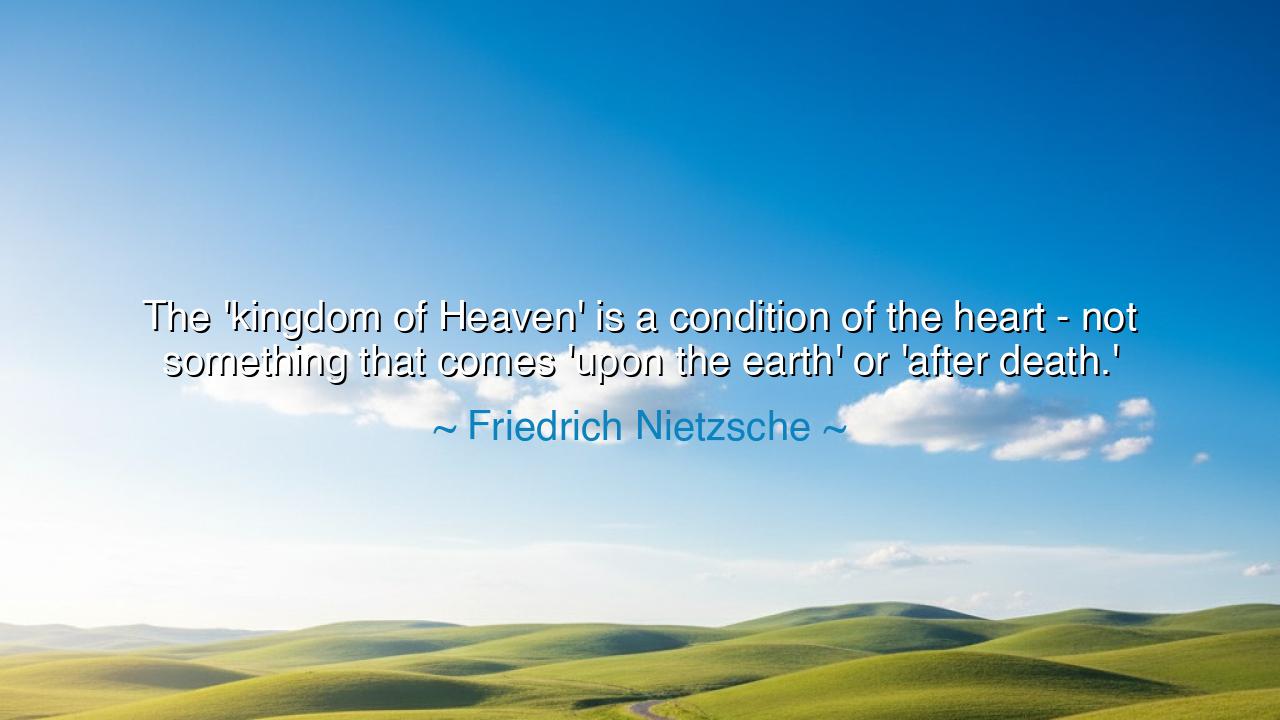
The 'kingdom of Heaven' is a condition of the heart - not
The 'kingdom of Heaven' is a condition of the heart - not something that comes 'upon the earth' or 'after death.'






When Friedrich Nietzsche wrote, “The ‘kingdom of Heaven’ is a condition of the heart — not something that comes ‘upon the earth’ or ‘after death,’” he was not speaking as a theologian, but as a seer of the spirit — one who sought to strip away the illusions that make men wait for salvation instead of living it. In these words, he casts aside the notion that Heaven is a distant realm or a future promise. Instead, he proclaims that it is something that must be realized within, a state of inner transformation rather than an external reward. Nietzsche’s wisdom here is both radical and eternal: the divine does not descend from the clouds, nor does it await the soul beyond the grave — it is born, or dies, within the human heart.
The origin of this quote lies in Nietzsche’s reflections in The Antichrist, a work that sought to examine and challenge the moral and spiritual foundations of Christianity as it was understood in his age. Though he is often remembered as the critic of religion, in truth Nietzsche was a critic of spiritual complacency — of the belief that holiness is passive or postponed. He looked back to the figure of Jesus, not as a god enthroned above, but as a teacher of the inner life — one who preached the power of the heart’s transformation here and now. In this sense, Nietzsche’s “kingdom of Heaven” is not an otherworldly paradise but the awakening of consciousness, the triumph of love, strength, and serenity within the soul.
To understand his meaning, one must imagine the heart as a kingdom — a realm of conflict and potential. Within it rage the forces of fear, desire, pride, and sorrow. The “kingdom of Heaven,” then, is not a place but a state of harmony, when the higher nature of man — compassion, courage, clarity — rules over the lower. It is the moment when one ceases to be driven by the chains of longing or despair and instead becomes a being of light. This, Nietzsche implies, cannot be granted by priests, nor purchased by prayer, nor awaited beyond the grave. It must be forged within, as one forges character — through struggle, through self-mastery, through the burning away of illusion. Heaven is not a gift; it is an achievement of the soul.
There is an ancient echo of this truth in the teachings of the Buddha, who also taught that the kingdom of peace — Nirvana — is not a place, but a state of mind, reached when craving and ignorance are overcome. Likewise, in the Stoic philosophers of Greece and Rome, we find this same understanding. Marcus Aurelius wrote that “the happiness of your life depends upon the quality of your thoughts.” Both he and Nietzsche, though born centuries apart, saw that the human being is not a prisoner of the world, but its interpreter. The “kingdom” is built not with stone or gold, but with thought and virtue. When the heart is ordered rightly, the world itself becomes radiant, and Heaven — once distant — stands revealed before one’s very eyes.
Consider the story of Victor Frankl, a man imprisoned in the death camps of Nazi Germany. Stripped of everything — his home, his family, his freedom — he still found within himself a kingdom untouched by cruelty. In that place, he realized that no tyrant could rule his heart unless he surrendered it. Amid suffering, he discovered meaning; amid death, he discovered life. “Everything can be taken from a man,” he later wrote, “but one thing: the last of the human freedoms — to choose one’s attitude in any given set of circumstances.” In that choice lies the same truth Nietzsche spoke of: that Heaven is not a destination, but a decision — a stance of the soul against despair.
The meaning of Nietzsche’s insight, then, is not to deny Heaven, but to bring it closer — to plant it in the soil of the living heart. He warns us against waiting for some distant paradise while we waste the miracle of the present. For what good is a faith that speaks of Heaven after death, if the world before us remains loveless and blind? The man who carries peace within himself brings Heaven wherever he walks. The woman whose heart burns with compassion builds Heaven in every act of kindness. The soul that forgives, that creates, that endures — these are the true architects of eternity.
So take this lesson, child of earth and spirit: do not search the skies for Heaven, for it is already within you, waiting to be awakened. Look not to the future or the grave for deliverance, but to the present moment, where your choices carve eternity. Govern your heart as a wise king governs his realm: with justice, with courage, with tenderness. Do not let desire or fear usurp the throne. Let your mind be still, your spirit kindled, your heart free. For as Friedrich Nietzsche teaches, the “kingdom of Heaven” is not a promise to be kept by the gods — it is the condition of the soul that dares to live divinely here and now. And when you live thus, even the dust beneath your feet becomes sacred ground.






AAdministratorAdministrator
Welcome, honored guests. Please leave a comment, we will respond soon